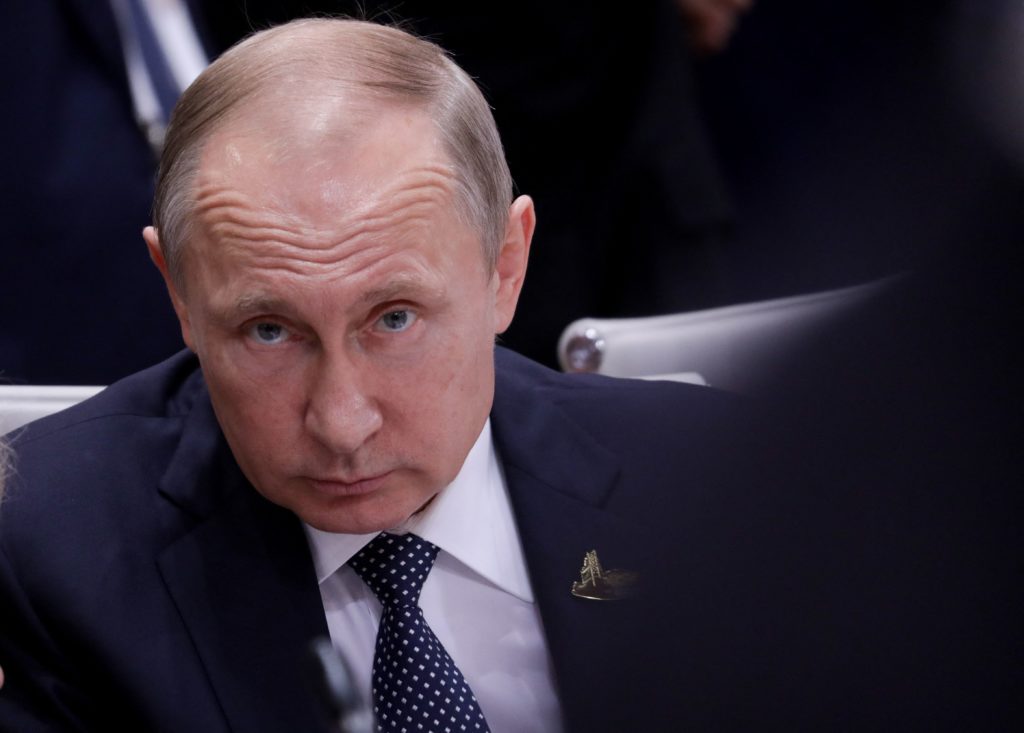The Black Sea grain deal can be saved and even expanded despite Russia’s threats to abandon it, a top United Nations official told POLITICO, even as Russian President Vladimir Putin issued a renewed warning on Friday that the Kremlin might kill it.
Moscow’s repeated threats come ahead of the expiry next month of a deal struck in the midst of its war in Ukraine that has taken some of the sting out of the global food crisis and thrown an economic lifeline to Kyiv.
“If it turns out that humanitarian corridors are being used to commit terrorist acts, then, of course, this will call into question the functioning of this corridor,” Putin was quoted by RIA Novosti as saying Friday. “But first this needs to be established.” Russia accused Ukraine of perpetrating a “terrorist act” after a fiery blast damaged a strategic bridge linking Crimea with Russia last week.
The U.N.’s Coordinator for the Black Sea Grain Initiative Amir Mahmoud Abdulla said he was optimistic that the deal will continue when it comes up for renewal on November 19. “There’s nothing that gives me any reason to believe it would not be extended,” Abdulla said in an interview hours before Putin spoke.
“Everything I’ve heard would intimate that it will not only be extended but potentially expanded,” Abdulla added. “Some of this is potentially about positioning but I don’t believe it’s about really trying to stop the initiative,” he added, saying that it was in the interest of all sides to keep the export corridor running and to expand it.
The prospect that Russia will refuse to allow the deal to continue past November — just four months after it was first created — risks plunging the world’s food system into further peril.
Food and fertilizer prices spiked to historic levels following Russia’s attack on Ukraine, a giant corn, wheat and sunflower exporter that was once known as the breadbasket of the Soviet Union. But Ukraine’s steadily increasing exports of over 7 million tons of foodstuffs have calmed global food prices to pre-war — albeit still high — levels.
For months, despite rising exports under the deal, Putin has poured skepticism over its effectiveness, making dubious claims that only tiny proportions of Ukraine’s grain is reaching hungry nations in the Global South — which have been rebutted by U.N. communications. The agreement does not stipulate where the grain must go, anyway.
Moscow claims that the deal isn’t facilitating its own ability to export agricultural products — even though it has imposed export controls on its vast trade in fertilizers.
Ukraine’s top diplomat Dmytro Kuleba accused Russia on Thursday of playing “hunger games,” by casting doubts about the future of the deal.
Billion-dollar question
So far, the pact has helped feed mouths around the world and provided funds for Ukraine’s farmers and war-ravaged economy. By reopening three ports around Odesa under the U.N. and Turkey-brokered agreement, Kyiv has generated some $3 billion, as the country’s military turns the tide against Russia’s invasion and Moscow looks increasingly isolated on the world stage.
Now, the multibillion-dollar question is whether Moscow is applying pressure to renegotiate new terms in its favor, for example on Western sanctions, or if the Kremlin is paving the ground to pull out and blame Ukraine and its Western allies?
| Mads Claus Rasmussen/Ritzau Scanpix/AFP via Getty Images
Grain traders are already preparing for a scenario in which the deal abruptly ends. “I wouldn’t expect a spike [in food prices] mainly because it’s already expected in the market,” said Carlos Mera, senior commodities analyst at Rabobank.
Abdulla, the U.N. coordinator, said both sides have concrete demands for an updated agreement.
One of Moscow’s key asks is to start up ammonia exports again — the gas is a central ingredient in many fertilizers. “No ammonia has moved [from Russia], and that is because the ammonia needs to actually get to the Ukrainian ports,” Abdulla said, who added that before the war, Russian ammonia used to travel through a pipeline to the Ukrainian port of Pivdennyi, from where it was exported.
Ukraine is also maintaining an optimistic tone about the prospects of the deal staying and expanding.
“We expect that the grain initiative will be further prolonged and extended [to] other remaining blocked Ukrainian sea ports,” Yaroslav Melnyk, Ukraine’s permanent representative of Ukraine to the U.N.’s Food and Agriculture Organization (FAO), told an FAO meeting in Rome this week.
Extension sought
Abdulla said that Kyiv wants “an extension of more than a year” to avoid a 120-day cycle and secure the export of next year’s harvest, on top of incorporating the port of Mykolaiv, east of Odesa, into the deal.
“I think if we can get to what I’ve just described over the next two weeks, that will be a huge win not only for Ukraine [and] the Russian Federation, but for the world,” Abdulla said.
Moscow’s real asks might go well beyond the narrow scope of Black Sea exports.
Russia wants “to use this as a bargaining chip to ask for more not only in the grain deal, but also generally to push for peace talks,” said Yevgeniya Gaber, a Turkey-based nonresident senior fellow for the Atlantic Council think tank. As Ukraine’s counteroffensive gains ground, Russia could use the grain deal “to get Ukraine to the negotiating table, otherwise threatening the whole world [again] with another food security crisis,” Gaber said.
If Putin does decide to pull the plug, Ukraine would be forced again to rely on costly, restrictive and cumbersome land routes. The move could “send a tremendously negative price signal to food commodity prices globally,” said Nazar Bobitski of KREAB consultancy and former Ukrainian trade diplomat.
Crucially, if the U.N. framework governing the Black Sea corridor were removed, few ships would be able to make the trip because insurance prices would skyrocket, disincentivizing all but the most gung-ho shippers. If the deal were to disappear, “you’d have nothing like the [approximately] 1 million tons a week” that are currently being exported, Abdulla said.
“I don’t believe that will happen because I think that there’s far too much to gain for all parties in this,” said Abdulla.
Susannah Savage contributed reporting.
This article is part of POLITICO Pro
The one-stop-shop solution for policy professionals fusing the depth of POLITICO journalism with the power of technology
Exclusive, breaking scoops and insights
Customized policy intelligence platform
A high-level public affairs network



